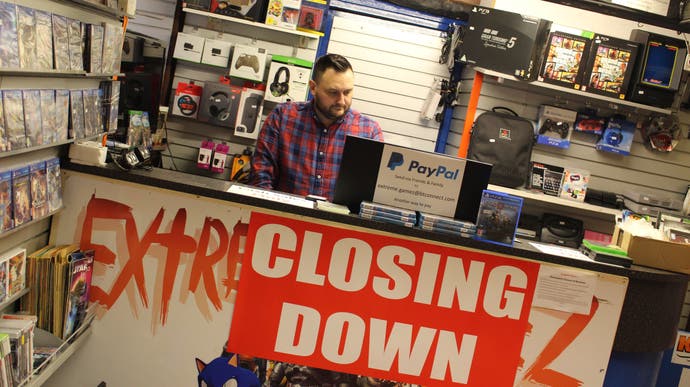The death of an indie store
After 25 years in business, Rare's local game store is closing its doors.
In a tumultuous time for games retailers, one store has clung on for longer than most. You'll find Extreme Gamez ensconced down a jitty (Leicestershire lingo for an alleyway between buildings, in case you were wondering) against the picturesque backdrop of Ashby-de-la-Zouch. The market town's ruined castle is a significant location in Sir Walter Scott's epic romance Ivanhoe and was partly demolished during the English Civil War to render the castle indefensible following the surrender of Royalist supporter Henry Hastings.
This appealingly modest town is steeped in history, yet it has a connection with the global video game industry that isn't immediately apparent. Ashby is where Ultimate Play The Game was established in 1982 by Tim and Chris Stamper - the company which would attain near-legendary status with home micro players before morphing into Rare, one of the UK's most famous game studios.
Extreme Gamez is a street away from Ultimate's first office, which was located in a row of tiny cottage-like shops. A short walk and a sharp right turn down Mill Lane Mews and you arrive at a squat, oddly-proportioned building which has plainly been in use for centuries rather than decades. Extreme Gamez has occupied this spot since 1994, when it was known as Computer Solutions; the current owner, Stuart Benson, acquired the business in 2000 and rebranded it with consoles as the primary focus. Since then, he has witnessed the explosion of console gaming, overseen numerous console launches and even embraced the burgeoning retro market, but earlier this year, he announced that after 25 years of trading the store would be closing its doors this month.
"Gaming has gone through some big changes, trying to keep pace with how quickly technology has moved on," says Benson. "It used to be a niche hobby; now it is one of the biggest forms of entertainment in the world. There are now many more ways of playing, as well as purchasing, games. From consoles to mobile or even Facebook games, from microtransactions to full digital downloads, the industry will continue to grow and evolve." The problem is, this evolution is coming at the cost of stores like Extreme Gamez, which has struggled to adjust to a rapidly changing marketplace.
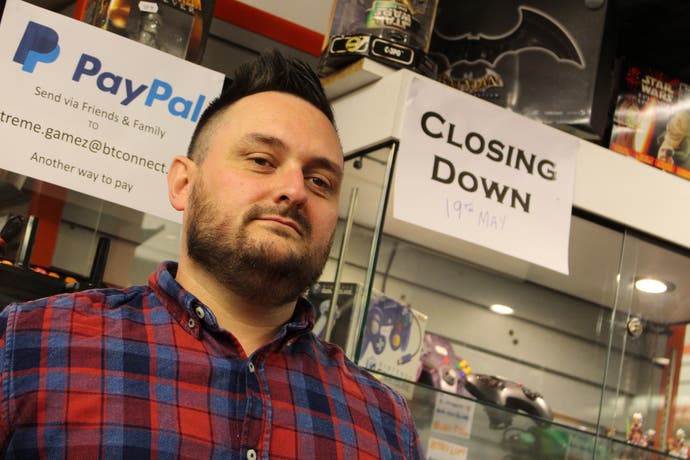
When Benson talks about the store's most successful periods, it becomes even more obvious how quickly the sands have shifted; only a decade ago Extreme Gamez was enjoying its most profitable period ever. "With the Nintendo Wii back in 2007, demand was so high we couldn't keep up," he says. "And that was with having daily deliveries and even importing EU consoles and swapping out the plugs to UK ones; people were grabbing huge bundles from us, with a minimum of four extra items with each console," Benson recalls. "We used to do a lot of events with Sony for games such as Motorstorm, and we did an early pre-release event for the PlayStation 4. Every console launch has been a highlight."
Such was the store's success than a second outlet opened in the nearby town of Swadlincote, and plans were afoot for a third - but in recent years Benson has found the downturn in trade had made it increasingly hard to keep his head above water. The Swadlincote store closed a few years ago, and footfall through the main Ashby outlet has declined alarmingly. "Business has taken a dramatic drop, thanks largely to digital sales rising over physical," he laments. "People's shopping habits are changing; more are spending their money online due to convenience and price." While Extreme Gamez, like many other stores, has endeavoured to ride this trend by selling both digital currency and download codes for games, Benson says the margins on such items are almost insignificant. "Turnover has been amazing for digital, but it's very minimal profit - less than one percent is made from digital sales in-store."
Other attempts have been made to diversify the business, with classic gaming being perhaps the most notable. While some predicted that retro was little more than a passing craze, the market has expanded over the past decade as more and more players return to past glories for that all-important nostalgia factor, or - if they're of the younger generation - seek out vintage games for their historical importance. "We've had kids of 10 or 11 come in here asking for Mega Drive and SNES stuff," says Benson. "It's a bit like vinyl collecting; in a digital world, people love to track down actual physical items." Such was the demand for retro that Benson turned the store's upper room into a vintage gaming zone; it was one of the few places in the UK where you could see a Gizmondo sitting in a cabinet next to an Atari VCS, NES, Mega CD and Philips CD-i 450. Rows and rows of games for the Mega Drive, SNES, Game Boy, C64 and many other classic formats were to be found, but sadly as the store enters its death throes, Benson has been forced to close off this fantastic 'retro loft' entirely. It now stands silent, the disconnected Wii U demo pod that stands there perhaps serving as the perfect visual metaphor for the whole situation.
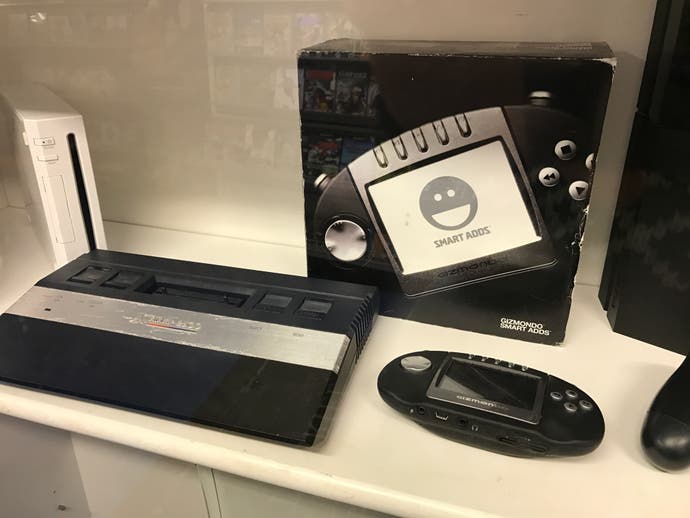
Benson is adamant that interest in classic gaming is so high that it's possible to use it as a focal point for his business, but there are caveats to consider. "We found people are willing to travel miles to browse and buy, and we could certainly survive on a retro-only model - but getting hold of stock is becoming harder as more and more stuff is taken online to storefronts like eBay," he comments. "There's also the issue that you can't just ring up a distributor and order ten copies of a particular title to satisfy demand; you have to take whatever's available." Merchandise which feeds off that all-important nostalgia element is more readily attainable, and Benson has experimented extensively with products like PlayStation baseball caps, Nintendo shoulder bags, Game Boy money boxes and many other licensed items in the past year; these have provided a welcome - if not life-changing - boost. With video games proving to be less and less reliable as a source of income, you have to be open to trying new things, he insists. "We've stocked comics, figurines, DVDs, trading cards, gadgets and even freestyle scooters and skateboards. Some were great ideas, others not so good."
With trade diminishing, Benson has felt the pinch of overheads such as rent, staff wages, bills and other costs associated with bricks and mortar stores that aren't always shouldered by online retailers. With stores like Extreme Gamez, you're also limited when it comes to reach, especially when compared to web-based outlets. Benson has also seen his capacity to compete on price fall away to almost nothing; larger retailers - such as supermarkets - are often able to sell at a lower price thanks to their enormous buying power.
Part-exchange has been a vital lifeline to independent stores since the 16-bit era, but even that is slowly being eaten away by promotions such as Microsoft's "Netflix for video games" service Game Pass, which offered subscribers access to Sea of Thieves on its launch date - Rare's latest title and one of the biggest Xbox One exclusives of the year - thus denying retailers valuable day-one sales. Microsoft has also confirmed that all Game Pass subscribers will get access to the console's big first-party releases in this manner. Such was Benson's anger at this move that Extreme Gamez stopped stocking new Xbox One software altogether.
"Services like Game Pass will stop people buying new first-party releases, as they represent a cheaper alternative when it comes to accessing new games," he says. "Also, these services damage used game sales, especially with over 160 games in the library. Why would you buy a £10 to £15 pre-owned game when you can get access to that game, plus many more, at a cheaper monthly cost? It's great for the consumer, but as for retail, it's easy to understand why places aren't stocking new releases." The inexorable rise of digital sales and the impact of services like Game Pass - and PlayStation Plus, for that matter - have combined to undermine what was previously one of Extreme Gamez's most profitable sectors. "We need part-exchanges to prop up our margins," Benson admits. "Without them, we would not sell half of the new releases, and with people downloading more titles it has a double effect. No one is buying the games in the first place to trade in."
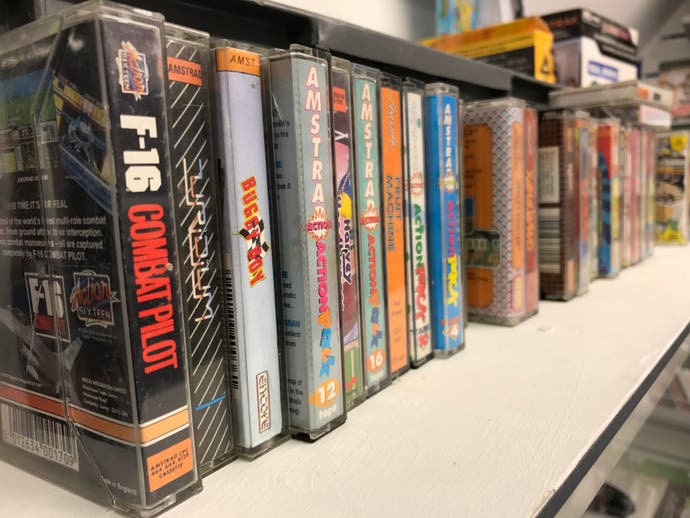
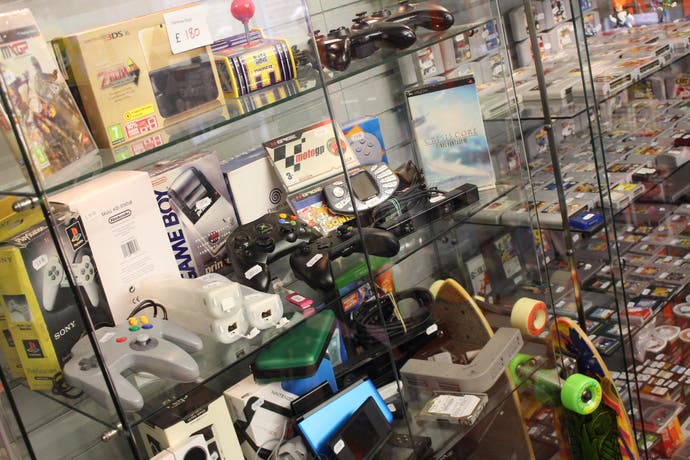
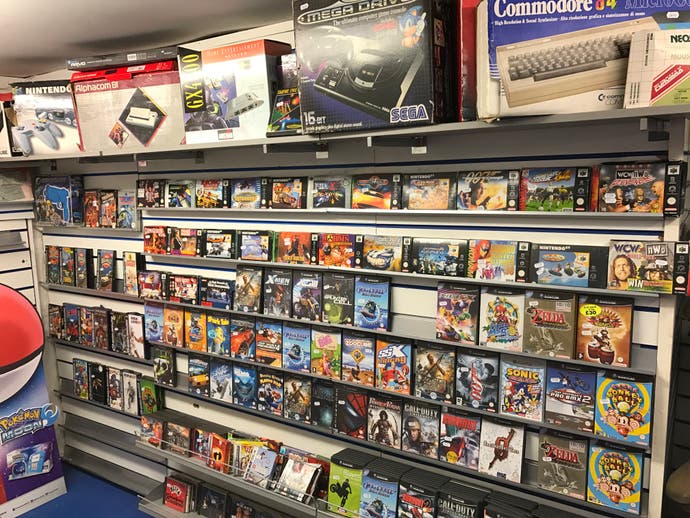
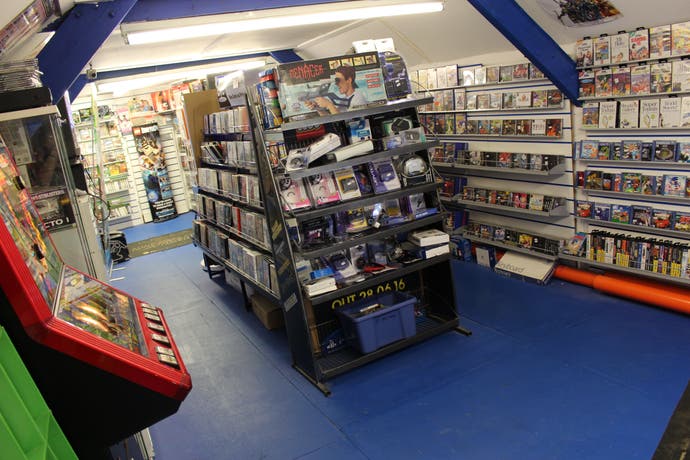
It's ironic that Sea of Thieves being included in the Game Pass service should cause such damage to Benson's business, as the store's association with Rare goes beyond being located a street away from its original headquarters. During the N64 era, when the Stampers were producing hit after hit for Nintendo, Extreme Gamez was Rare's store of choice. "The staff regularly bought new releases, ringing up to pre-order copies of upcoming titles, mostly on N64," Benson recalls. "Sometimes they would buy multiple copies of the same title for staff to play through. They also purchased extra copies of their own games to put into the company's archives." Since the Microsoft buy-out this has all but stopped, but Benson has maintained a link nonetheless. "We have had dealings with Playtonic, who are based just up the road in Burton-on-Trent," says Benson. "They kindly signed copies of Yooka-Laylee for us. We follow other studios which have splintered from Rare - such as Gory Detail and Makin Games - via Twitter, and we've had quite a few ex and current Rare staff pop in for a quick social visit now and again."
One such patron is Kevin Bayliss, who worked at Rare between the years of 1987 and 2005 on titles such as Donkey Kong Country, Killer Instinct, Battletoads, Diddy Kong Racing and Star Fox Adventures. Bayliss vividly recalls making trips from Rare's current HQ in Twycross to purchase new titles. "Extreme Gamez has always been a quick and easy 'go to' shop that you could nip to in your lunch hour," he says. "Twycross is miles from any real big town, so having that place on our doorstep was a godsend." Bayliss moved away from the area when he left Rare over a decade ago, but has recently joined Playtonic and moved back to the Midlands. He's enjoyed reacquainting himself with the shop, using its retro section to source titles from his own past. "I recently went to collect some of the old games I'd worked on for the SNES at Rare. I bought California Games for the NES from them, and I picked up a couple of old Mega Drive games, too."
Bayliss is a local lad who seems to have a real sense of pride about a region of the UK which is often branded as unfashionable or dull; the upcoming closure of the store has, therefore, had a considerable impact on him. "It saddens me when any small business has to come to an end, but especially when it's one that I know has been running for a long time," he says. "Today, more and more people are buying online, and there are more options when it comes to buying video games than there ever was, but I guess it's a sign of the times. While I welcome the reduction in plastic and packaging that pollutes our planet, I think it's lovely to hold a physical copy of a game that might have many memories for me. Extreme Gamez had always been my favourite shop in Ashby with a great little 'Retro Loft' that was popular for a lot of collectors."
With the May 19th closure looming, Benson plans to take his business entirely online - something he has dabbled with in the past, with mixed results. "We are only closing the physical store; the business will continue to trade with all of our social media channels staying open," he says. "Depending on the scale of business we do, we will determine if an online store is viable or we continue selling via third-party sites - both eBay and Facebook continue to be very good for us when it comes to selling stock. We have a large regular customer base, and a good few of these are very loyal and only buy from us; we hope they will continue to do so in the future," Benson is unsure if he will create his own dedicated website for e-commerce, though. "We ran our own website for a few years with limited success; we found it hard to become noticed what with the larger reach and selling power of rival stores, and we ended up selling more in-store at reduced margins."
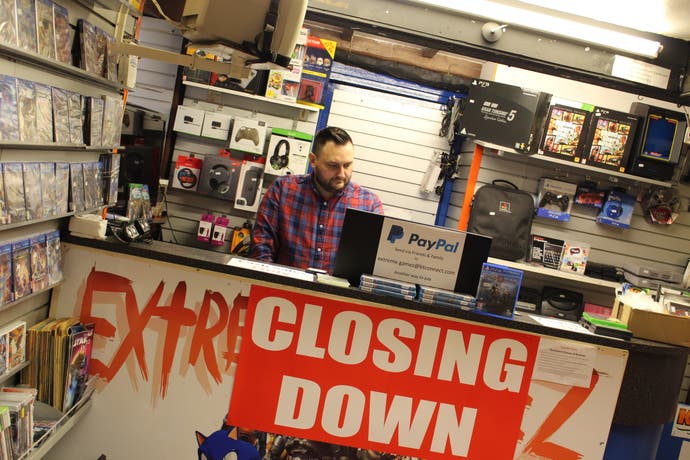
This transition will at least ensure that Extreme Gamez doesn't vanish from the face of the earth forever, but it's clear that Benson feels something very precious is being lost in the process. An online shopping experience may offer positives such as overall convenience and lower prices, but there are some elements which cannot be replicated when shopping on the web. "Being able to talk to real gamers, being able to pick up the product to see the quality of the goods, being able to browse - and in some cases, try out - items in-store, finding different items not found elsewhere; these are all things that you simply cannot get when shopping for games online," he says.
Former Rare staffer Bayliss hopes that physical stores can find a way to survive. "People are always going to want to buy consoles or accessories, and you often end up picking up merch for your favourite games, too," he says. "It's the best way to see what you're actually getting - there's nothing like going into a shop and buying a treat for yourself or someone, and then there's the impulse buying that might hit you when you pass a store and see something you want, but had no intention of buying anything in the first place. There aren't as many small independent retailers out there - the stores that we all used to rush to so we could get a glimpse of the latest game as it was loaded up for the first time - because we are aware of what's coming so long before a new game is released thanks to the internet."
But given what we know about the changing state of the industry and the rise of digital, can physical stores really survive when all they have to offer is the human element? "Maybe not in their current format," Benson replies. "Changes need to be made. Games retail appears to be in a transitional period, and I believe it will come back bigger again in the future, like it has for record stores. But physical stores can only stay open with local support. It's not always about price; you need to consider the additional service you're getting that online retailers - and supermarket chains - don't provide. Indie shops give you a more personal experience and, by and large, are not run by greedy corporate types who don't care about their customers. They are operated by average people like myself who are just trying to cover their mortgage and pay for their kids to go football club or dance class."
Benson's final warning may seem hollow in today's gaming arena, but as he prepares to shutter the store he has maintained for almost 20 years, it serves as a dire warning to those of us who have an affection for the physical shopping experience, but have neglected our local indie over the past few years. "Think before using the large, out-of-town shops," he concludes. "Pause before clicking 'add to basket' via your phone or PC, and think: could I get the same item locally and keep my high street vibrant and alive? Use it or lose it."
